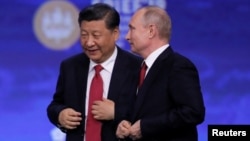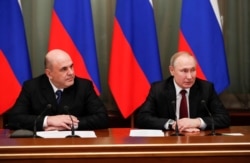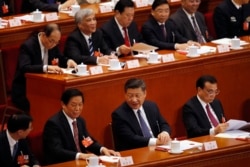Russia’s President Vladimir Putin and China’s President Xi Jinping are two of the most powerful rulers in the world.
Now, both have moved to extend their hold on power.
Last week, Putin announced major constitutional changes that, experts say, will extend his control beyond the end of his term in 2024.
Many note the similarity of the move to what Xi did in 2018. That year, Xi had China’s constitution changed to remove term limits on the Chinese head of state.
China and Russia have important influence in world events. China is economically strong. Its military is growing quickly in strength.
Russia has shown that it is willing to become involved in conflicts such as Syria’s civil war and to influence elections in other countries. It has used cyberattacks and misinformation to gain influence.
David Zweig is a professor emeritus of social science at the Hong Kong University of Science and Technology. He said Putin and Xi show a tendency of authoritarian leaders to hold on to power as long as possible, often dying in office.
“Very few authoritarian leaders give up power, always convinced that only they can save the country, which also justifies and makes their hunger for power morally correct,” Zweig said.
Differences in two authoritarian systems
Although similar, the systems that Xi and Putin lead have notable differences. Xi has often brought attention to the fall of the former Soviet Union as a danger to the Chinese Communist Party’s rule.
The Chinese government has crushed opposition and is increasing its control of the economy and civil society. It has created the appearance of complete unity around Xi.
In Russia, however, some parts of a multiparty democracy remain although opposition leaders are jailed on a usual basis. Russia also has faced severe international restrictions since it seized Crimea from Ukraine in 2014.
Russia’s constitution requires Putin to leave office when his term ends in 2024 after serving two consecutive terms. He has proposed amendments to the constitution that would give the lower house of parliament, the Duma, the power to choose the prime minister.
Putin’s changes include increasing the importance of a body few have heard of before: the State Council. Currently the body which includes local and federal officials is supposed to be advisory and is led by the president. Putin wants more power for the group which oversees national security issues.
Sergey Radchenko is a professor of international relations at Cardiff University. He believes either the prime minister position or a place on the State Council would permit Putin to extend his influence past 2024.
Putin has led Russia for more than 20 years making his rule the longest since leader Joseph Stalin. He is known for often biting criticism of the West and a concern for his public image.
Xi’s move to end term limits on the Chinese presidency in March 2018 was met with almost no dissent. The son of a former high communist official, Xi became the head of the party in 2012. He then began increasing his power through a major anti-corruption campaign and by silencing opposition of all kinds.
Xi’s removal of term limits is considered an attack on former leader Deng Xiaping’s attempt to ease power away from individual leaders. Deng sought to avoid a repeat of the cult of personality which followed Communist China’s first leader Mao Zedong. Many Chinese blame such support for the ten years of political violence of the Cultural Revolution which ended in 1976.
China observers note that unlike earlier leaders, Xi has not shown who might be his successor, causing many to believe he plans to remain leader for a long time.
I’m Mario Ritter, Jr.
Daria Litinova and Ken Moritsugu reported this story for the Associated Press. Mario Ritter Jr. adapted it for VOA Learning English. Caty Weaver was the editor.
_________________________________________________________________
Words in This Story
tendency –n. a way of behaving, proceeding, etc., that is developing and becoming more common
authoritarian –adj. describing a system that requires obeying rules or laws or that limits personal freedom
convince –v. to cause (someone) to believe that something is true
consecutive –adj. following one after the other in a series
cult of personality –noun phrase a situation in which a public figure (such as a political leader) is deliberately presented to the people of a country as a great person who should be admired and loved







